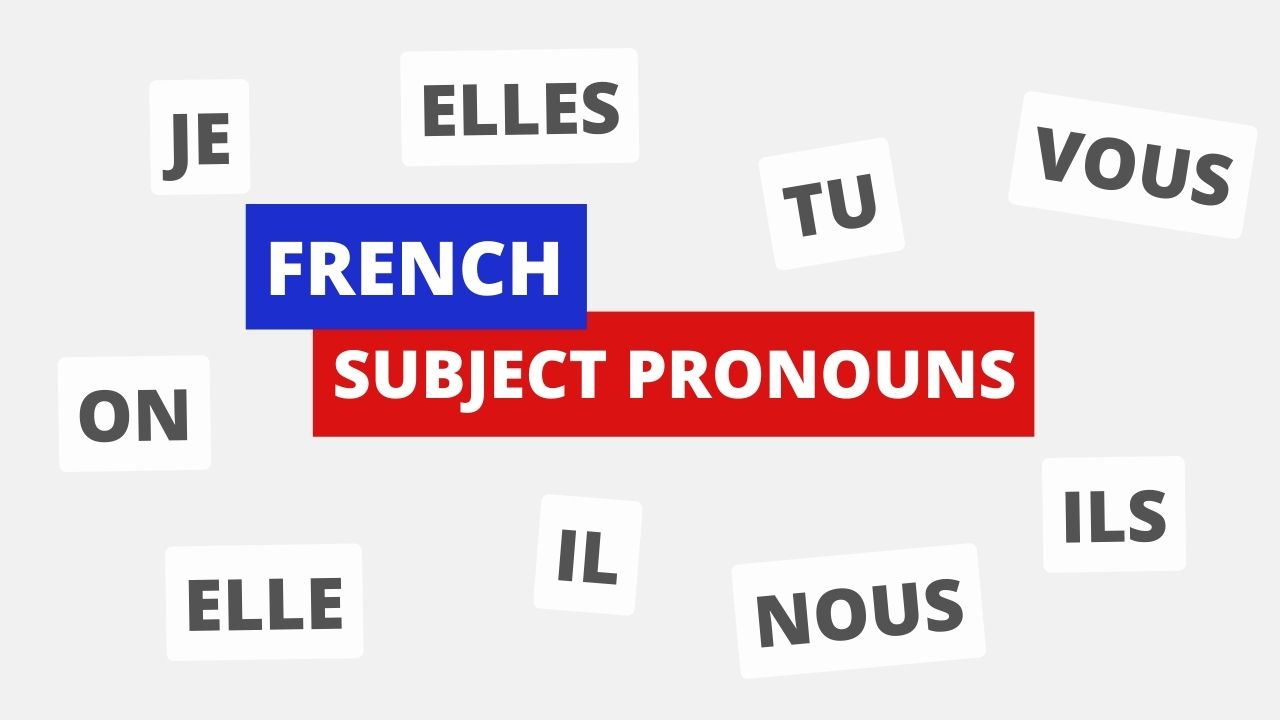Menu
Close
French Subject Pronouns are slightly different than English ones. We have different plural subject pronouns for masculine and feminine, for example. In this article, we will see all the French Subject Pronouns with examples, audio, and a free PDF to download.
Free PDF at the bottom of the page 📄

In French, almost everything agrees in gender and number, including French subject pronouns. The English “it” doesn’t exist in French. It’s either “he” or “she.” “They” is also different in French. We use the same pronounces as “he” and “she”, but plural.
The singular French Subject Pronouns, referring to only one thing or one person, are:
Je / J’ – I
Tu – You
Il – He
Elle – She
On – We (conjugated like a singular pronoun – See more below)
Plural French Subject Pronouns are similar to the English ones, only They change because of gender.
Nous – We
Vous – You
Ils – They (masculine)
Elles – They (feminine)
Je / J’ – I
Tu – You
Il – He
Elle – She
On – We
Nous – We
Vous – You
Ils – They (masculine)
Elles – They (feminine)
Je – Je mange une pomme. I am eating an apple.
Tu – Tu téléphones à Paul. You are calling Paul.
Il – Il est professeur. He is a professor.
Elle – Elle a 10 ans. She is 10 years old.
On – On va au restaurant ce soir. We are going to the restaurant tonight.
Nous – Nous sommes mariés. We are married.
Vous – Vous êtes en retard. You are late.
Ils – Ils ont faim. They are hungry.
Elles – Elles jouent au football. They play soccer.
“On” can be confusing but is really easy to use. It’s the less formal way to speak in French and also the easiest way to conjugate.
The most common way to use it is to replace “nous”. It conjugates like “il ou elle”.
On est de retour = Nous sommes de retour.
We are back.
On a passé de super vacances = Nous avons passé de super vacances.
We had a great vacation.
The other way to use it would be the equivalent of “one” in English.
On peut admirer l’architecture en Europe.
One can admire the architecture in Europe.
As you probably noticed, we don’t use “it” in French. It’s either “IL” ou “ELLE”.
IL represents someone or something masculine.
Jean est en route = Il est en route.
Jean is on his way = He is on his way.
Le magasin est fermé = Il est fermé.
The store is close = It is close.
ELLE represents someone or something feminine.
Marie est à l’école. = Elle est à l’école.
Marie is at school = She is at school.
La voiture est rouge = Elle est rouge.
The car is red = It is red.
Exactly the same use as “IL” ou “ELLE” but plural this time.
ILS represents someone or something masculine.
Luke et Mark ont 15 ans = Ils ont 15 ans.
Luke and Mark are 15 years old = They are 15 years old.
Les gâteaux sont très bons = Ils sont très bons.
The cookies are really good = They are really good.
ELLES represents someone or something feminine.
Ashley et Diana sont au cinéma. = Elles sont au cinéma.
Ashley and Diana are at the theater = They are at the theater.
Les chaises sont noires = Elles sont noires.
The chairs are black = They are black.
But what if you want to talk about feminine and masculine together? Then you use only “ILS”, not “ELLES”.
Ashley et Mark ont faim. = Ils ont faim.
Ashley and Mark are hungry = They are hungry.
L’ordinateur et la souris sont sur le bureau = Ils sont sur le bureau.
The computer and the mouse are on the desk. They are on the desk.
We use “TU” when we talk to someone we know. Friend, family, classmate, colleague, …
We use “VOUS” when we talk to someone we don’t know well or has a higher position than us and we need to show them respect.
You don’t know well: the cashier, the principal, the flight attendant, …
You show respect to your professor, your boss, sometimes your parents-in-law, etc..
To your friend:
Est-ce que tu veux du chocolat?
Do you want some chocolate?
To your boss:
Est-ce que vous voulez un café?
Do you want a coffee?

Check out this lesson on my YouTube channel if you prefer learning with a video lesson. Or my other French Learning material.


5 Responses
Do you have a video about how an when to use the pronouns ‘Y’ and ‘en’?
I do 🙂 Here it is: https://youtu.be/eiJheky4N6w
Have a great day!
You too 🙂
Such a clear explanation.. Hats off..